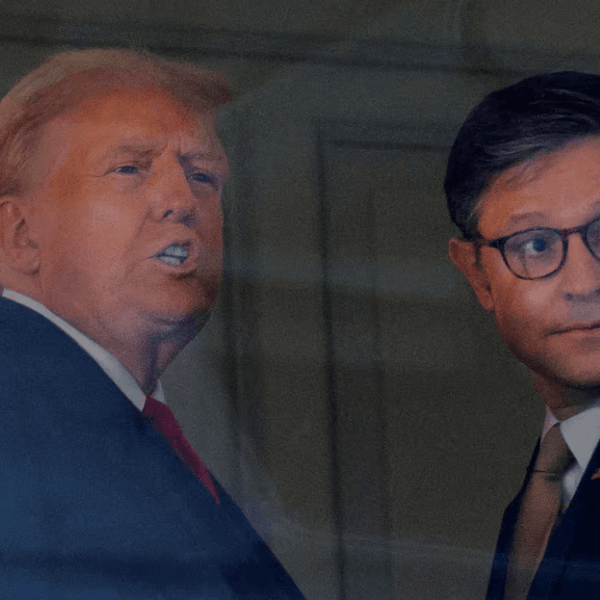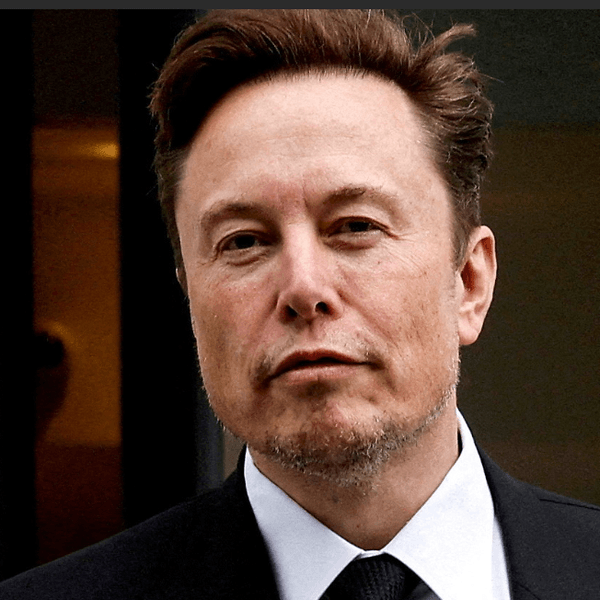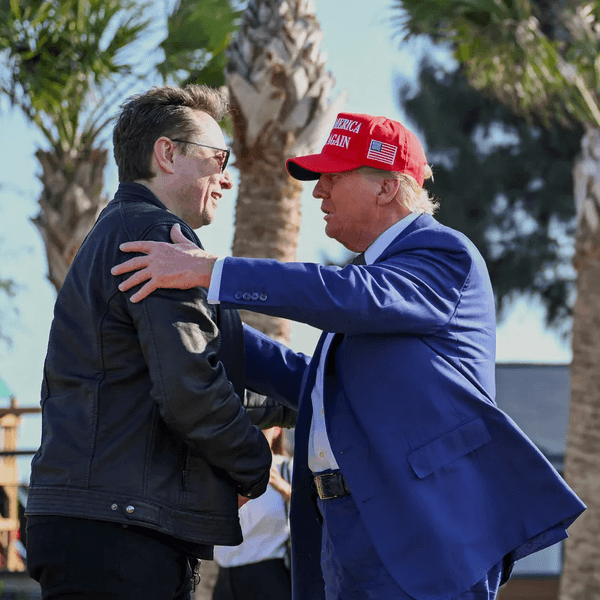Was Comey Fired Because The FBI’s Sights Were Turning Toward Trump’s Russian Mobster-Connected Business Ties?

Reprinted with permission from Alternet.
What is President Donald Trump trying to hide?
That’s the question on everyone’s mind since Trump fired FBI director James Comey on Tuesday. What’s been learned since that Watergate scandal-invoking bombshell dropped has only underlined the question.
Comey had been seeking more funds to go where the investigation was taking the FBI, media reported Wednesday. The Justice Department called this assertion “totally false,” affirming that whatever trail Comey’s FBI was following will likely go no further.
There are also several federal and state grand jury investigations underway, it was revealed Wednesday, first reported by two bloggers—Claude Taylor with ties to the Democratic Party and Louise Mensch with ties to right-wing sites. What these panels are specifically looking at is not known, although foreign surveillance search warrants reportedly have been issued. The presumption is they are tracing the Trump campaign’s collusion with Russia to win the presidency.
Meanwhile, Republican Senate Majority Leader Mitch McConnell said Wednesday there would be no independent prosecutor to pick up where Comey’s FBI left off, slickly saying that would “impede current work.” And there was also news that New York Attorney General Eric Schneiderman has launched a grand jury investigation.
As the details around all these developments swirl—including claims by Republicans there is nothing to all of this—a tantalizing observation is emerging from investigative reporters who have been following Trump’s organized crime ties for months. What if the FBI investigation was heading into Trump’s mobster-connected business empire, including his partnerships with Russian oligarchs, where the president has broken racketeering, money-laundering and organized crime laws? This is the FBI’s expertise, not the murkier and harder-to-prove charge of Russian campaign collusion.
“There’s one camp that says there’s nothing to this. Which I think is garbage. There’s another camp that Trump was a mole, is a puppet, it’s all about collusion with respect to last year’s election. And I say the jury is out on that,” said James Henry, a corporate lawyer-turned-financial investigative reporter for DCReport.org, where his investigations have linked Trump and his team to Russian mobsters. “Let’s see the FBI investigation. Until we know what it is, the inside details on the FISA warrants or whatever they have, we won’t know.”
Then there is a third camp, Henry said, which holds that the FBI was probing Trump’s business ties with Russian organized crime.
“There’s a third camp, which is stuff I have been working on, is the organized crime,” he said. “This guy’s a mobster. He has all these dodgy business partners. He knew or should have known that they were involved in organized crime, money-laundering, racketeering. That’s pretty hard to deny. We see the people he’s been in business with. We see the deals over and over again. It’s in plain sight. That’s the theory I’ve been working on… You could make a case on good old-fashioned criminal law if you had a prosecutor.”
If you had a prosecutor—stop right there. What if what Trump’s trying to hide is more about protecting his fortune than seeking Russian help to win the presidency? Firing Comey, the nation’s top cop, and having the Senate Republican leader say there would be no independent investigator dampens the prospect. It is true that Comey will testify in the Senate next week and its Intelligence Committee has subpoenaed documents from Michael Flynn, Trump’s ex-national security adviser (who was fired for lying about talking to Russian diplomats about U.S. sanctions before Trump was inaugurated). But congressional investigations don’t end up in court like FBI investigations do.
But Trump is in court, where his fortune is on the line—and not just for stiffing contractors. His business partners have been sued by a private attorney, Fred Oberlander, on behalf of the public for tax evasion tied to a New York City high-rise in SoHo, where Trump’s co-owners include a Russian mobster and known oligarchs. The New York attorney general did not join this suit, but has empaneled a grand jury, whose focus is secret but is likely to involve the state’s financial laws.
There’s some evidence to suggest that Comey was pointed in this direction—toward Trump’s criminal activities—as the Russia campaign collusion investigation widened. When Comey testified in Congress in recent weeks, the best Democrats could do was ask if the FBI was investigating specific figures in Trump’s campaign and business deals. They were giving him dots to connect. Rep. Eric Swalwell, D-CA, asked Comey if he knew of Russian mobster Felix Sater’s relationships to Trump. A higher-profile mention was Rudy Giuliani, who had one foot in Trump’s campaign and another in his Russian-connected deals.
Vermont Sen. Patrick Leahy, the top Democrat on the Judiciary Committee, pushed Comey on Giuliani. On the political campaign side of the ledger, Giuliani told Fox News in October that a surprise was coming that would be a big blow to Hillary Clinton. The speculation then was that Giuliani’s allies in the New York FBI office had used a laptop taken from Anthony Weiner (the ex-husband of Clinton’s top aide) to push Comey to announce the FBI was reopening its inquiry of Clinton’s handling of classified emails. Comey told Leahy that they were looking at what happened inside the FBI and at Giuliani. Here’s the transcript of the conclusion of that exchange:
“It’s a matter that I’m very, very interested in,” Comey said.
“But are you looking into it?” Leahy replied.
“Correct,” Comey said.
Giuliani is also linked to some of Trump’s Russian partners, including Bayrock LLC, which helped Trump build a New York high-rise in SoHo and illegally hid the identity of another partner, Felix Sater. Bayrock hired Giuliani’s law firm to create a shell corporation based in the Netherlands that a new hour-long Dutch TV documentary called an international “money-laundering” operation.
When it comes to incriminating Trump, Russian campaign collusion may yet be proven. But there is no denying what journalists are finding out about Trump’s ties to Russian oligarchs and mobsters. That business is the FBI’s specialty, said Henry, who wondered aloud if this was the direction they were headed—if following the evidence trail leads to more than the 2016 campaign.
“I do know the FBI people involved in it were pretty impressed with the scope of the investigation and eagerness to get to the bottom of a lot of this stuff,” Henry said.
In the meantime, the documentary by the Netherlands’ Zembla TV, “The Dubious Friends of Donald Trump, Part 1: The Russians,” traces Trump’s Russian mob-connected business partners, and it is damning. “In the case of Bayrock, we have a company that is led by people who have extremely shadowy backgrounds and profiles,” said Michael D’Antonio, a Trump biographer and Pultizer Prize winner. The narrator says they will show that Bayrock “has connections with the Russian mafia. One of the owners is allegedly involved in the prostitution of minors. And Bayrock is setting up shady business deals in the Netherlands.”
The documentary’s crew went to New York City, where they interviewed attorney Oberlander, who is leading the citizens’ suit against Bayrock for massive tax fraud. “Anybody who is running a business through a pattern of crime is guilty of racketeering. Anybody who is helping them is guilty of racketeering conspiracy and they go to jail. And anybody injured by what they did can sue for triple damages,” he told the film crew, referring to Trump’s possible racketeering role.
If the question is what Trump is hiding by firing Comey, it could be more about concealing his business dealings like the partnership with Bayrock than seeking Russian help to win the presidency.
So far, it’s been fairly apparent how Trump’s policies are helping Russia. His rejection of climate change policy helps a country with no green energy infrastructure and where fortunes are still to be made in gas and oil drilling. His reluctance to do anything new with the Ukraine maintains the status quo. He also has apparently rejected calling for Assad, Syria’s brutal dictator and Russian ally to step down, again leaving Russia no worse off.
Meanwhile, domestically, Trump seems to be copying what unfolded in Russia after the Soviet Union broke up and several dozen oligarchs and mobsters emerged with control of the country’s mineral wealth: he’s setting the stage with executive orders for a similar giveaway, including the possibility that some of Trump’s private investors from Russia could end up with stakes in newly freed-up U.S. mineral assets.
“This is a land grab,” said Henry. “If you don’t get that Putin and the Russians transferred a hell of a lot of wealth of the Russian government to a handful of 25 oligarchs. Right now there are five states in the U.S. that are roughly 80 percent or more owned by the federal government. Trump has just issued executive orders that will open up a lot of that land, either to outright privatization or to mining deals like we’ve never seen before.”
“There’s nothing ideological,” Henry said. “What connects all of these people in the Trump government is they are all about money. This is going to be a huge payday for these people and their friends. At the end of the day, they take care of themselves.”
What if Comey’s FBI was onto this game plan? What if they shifted their focus beyond Russian campaign collusion to Trump’s mob ties, his unprosecuted illegal concealment of his Russian investors, his tax evasion, and other money laundering schemes that put Trump’s fortune, business empire and possibly his presidency at stake? What if the simplest solution was just to fire Comey and to pressure McConnell to go along? Not that the Senate Majority Leader needed much persuading.
“McConnell received a million-dollar contribution from Russians back in October that we know about,” Henry said. “There was a million-dollar contribution to the Senate leadership PAC in the name of a New York company owned by Len Blavatnik.” Blavatnik is a Russian-born billionaire-oligarch who invested in aluminum companies in Russia and became a U.S. citizen decades ago.
Steven Rosenfeld covers national political issues for AlterNet, including America’s democracy and voting rights. He is the author of several books on elections and the co-author of Who Controls Our Schools: How Billionaire-Sponsored Privatization Is Destroying Democracy and the Charter School Industry (AlterNet eBook, 2016).
This article was made possible by the readers and supporters of AlterNet.








